Key takeaways:
- Luxury retirement homes foster vibrant communities, offering personalized services and engaging activities that enhance residents’ well-being.
- Gardening benefits retirees by providing a sense of purpose, promoting physical activity, and facilitating emotional healing.
- Participating in activities and workshops, such as gardening, can help reduce feelings of loneliness and encourage personal growth through social connections.
- Incorporating gardening into daily life promotes mindfulness and can be a fulfilling way to connect with nature and others.

Understanding luxury retirement homes
When I think about luxury retirement homes, I imagine a lifestyle brimming with comfort and elegance, designed to cater to the unique needs of seniors. It’s not just about spacious apartments or upscale amenities; it’s about fostering a vibrant community where residents feel valued and connected. Have you ever considered how your surroundings can profoundly impact your well-being?
In my experience, living in a luxury retirement community often means access to personalized services such as gourmet dining and tailored fitness programs. One resident shared how the on-site wellness center transformed their daily routine, allowing them to pursue fitness goals while making new friends. Isn’t it remarkable how a supportive environment can encourage us to thrive in our golden years?
Additionally, luxury retirement homes focus on providing engaging activities that cater to various interests and hobbies, promoting mental stimulation and social interaction. I recall the joy expressed by a participant in a painting workshop, who discovered a hidden talent and newfound passion at the community. Isn’t it inspiring to think about the surprises that life can still hold, even in retirement?
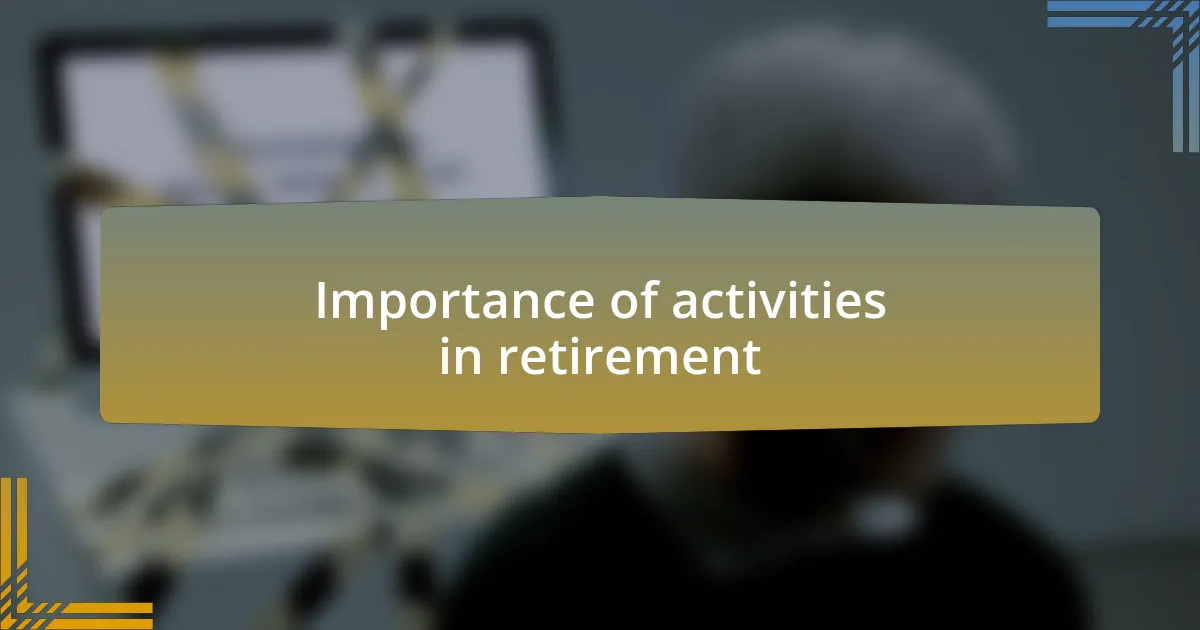
Importance of activities in retirement
Engaging activities play a crucial role in retirement, significantly impacting both physical health and mental well-being. I’ve noticed that residents who actively participate in workshops or group outings appear to have a more positive outlook on life. Have you ever experienced the thrill of learning something new? That spark in the eyes of a senior picking up gardening tools for the first time is a testimony to the joy that comes from trying new activities.
Moreover, these activities serve as a bridge connecting individuals, fostering friendships that might not have formed otherwise. I distinctly remember a bazaar event where two strangers struck up a conversation over handmade crafts; by the end of the day, they were exchanging contact information and made plans to meet for coffee. Isn’t it incredible how simple conversations can lead to lasting relationships?
Finally, participating in structured activities can stave off feelings of loneliness and isolation, which many face during retirement. I once attended a cooking class alongside a resident who had recently lost her spouse. Watching her find solace in the company of others while exploring culinary delights was heartwarming. I believe that by filling our days with meaningful pursuits, we create opportunities for joy and connection that enrich our retirement experience.
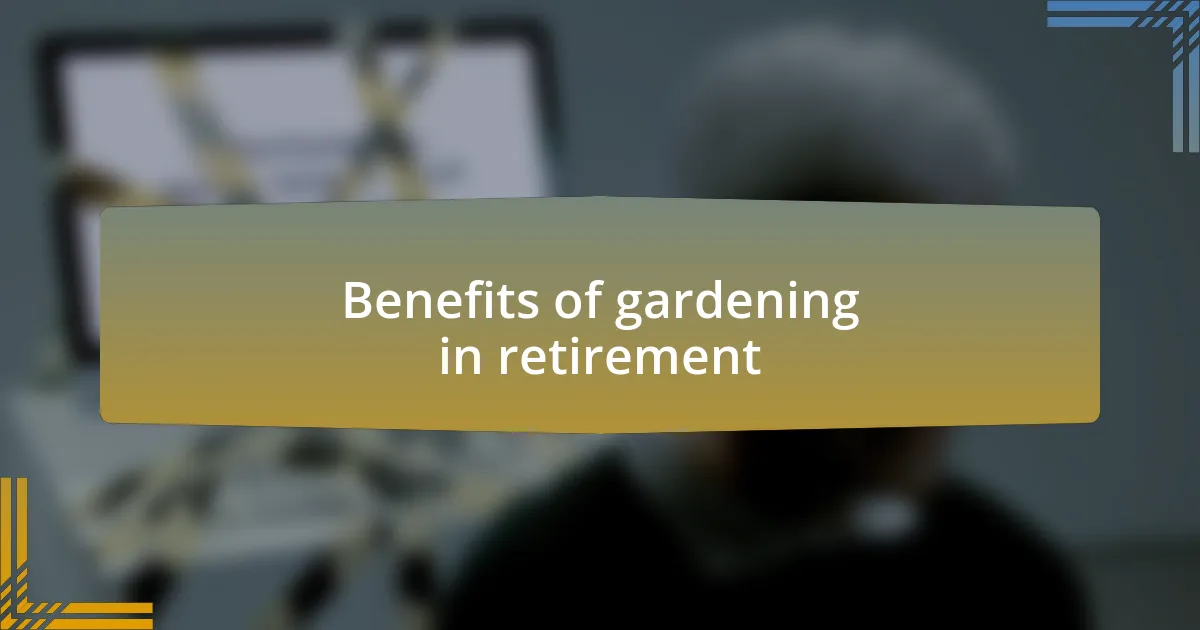
Benefits of gardening in retirement
Gardening in retirement is more than just planting seeds; it’s a chance to cultivate a sense of purpose. I recall a workshop where a resident named Margaret transformed a neglected patch of soil into a vibrant flower garden. Watching her meticulously tend to those blooms became therapeutic for her. Have you ever felt the satisfaction of nurturing a living thing? There’s nothing quite like it.
The physical benefits of gardening can’t be overlooked. The gentle movements involved in weeding, planting, and pruning provide a wonderful way to stay active. I’ve seen how residents who regularly garden find themselves more limber and energetic. Engaging in this type of activity not only promotes fitness but also helps maintain independence as we age.
Emotionally, gardening offers a unique form of mindfulness. There’s something calming about getting your hands dirty and connecting with nature. I remember a resident who shared how her garden became a sanctuary where she could reflect and find peace. Doesn’t it make you wonder how something as simple as soil and seeds can foster healing and growth in our lives?
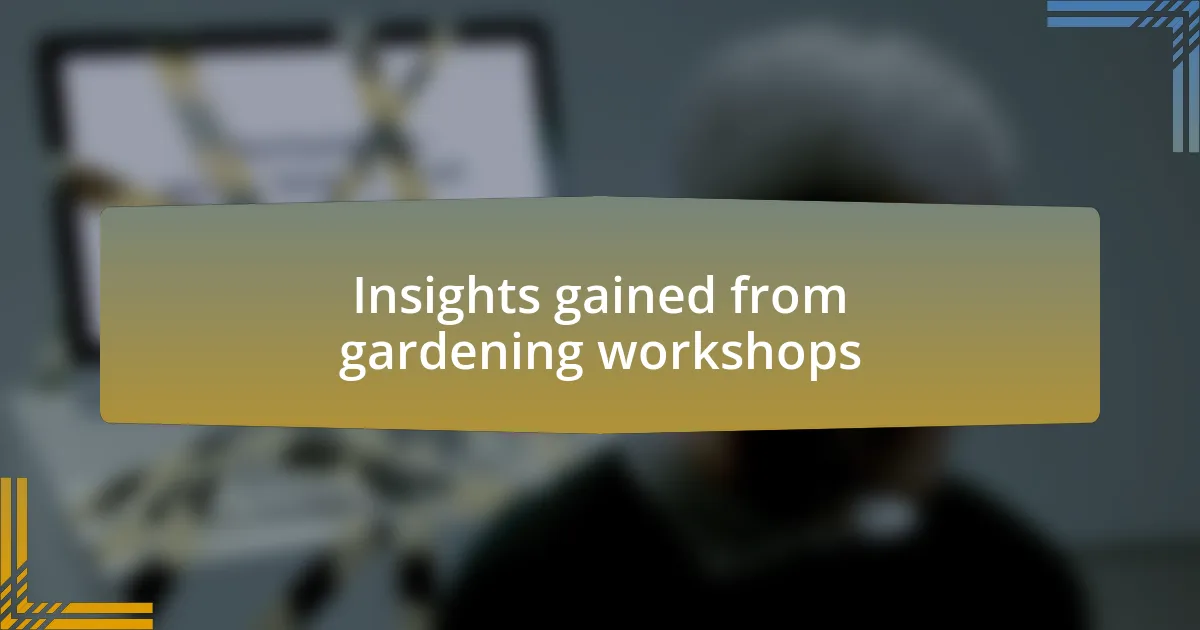
Insights gained from gardening workshops
Participating in gardening workshops has deepened my understanding of the connection between nature and well-being. One workshop experience sticks with me: we learned about companion planting, which taught me how different plants can enhance each other’s growth. It made me think—aren’t our own relationships a bit like that? Nurturing one another can help us thrive.
In another session, we explored the significance of seasonal changes in gardening. I remember a fellow participant, Tom, who described how he structured his garden around the seasons, allowing him to appreciate each phase of growth and decline. This made me reflect on how the changes in our lives, much like the seasons, can be embraced and celebrated. Isn’t it fascinating to think about how we, too, can cultivate resilience through our experiences?
One of the most poignant moments in these workshops is witnessing the joy gardening brings. I once spoke with a woman who, after losing her spouse, found solace in growing vegetables. Each harvest became a reminder of life’s cycles. It raises the question: can tending to plants heal a grieving heart? From my perspective, it certainly seems possible.
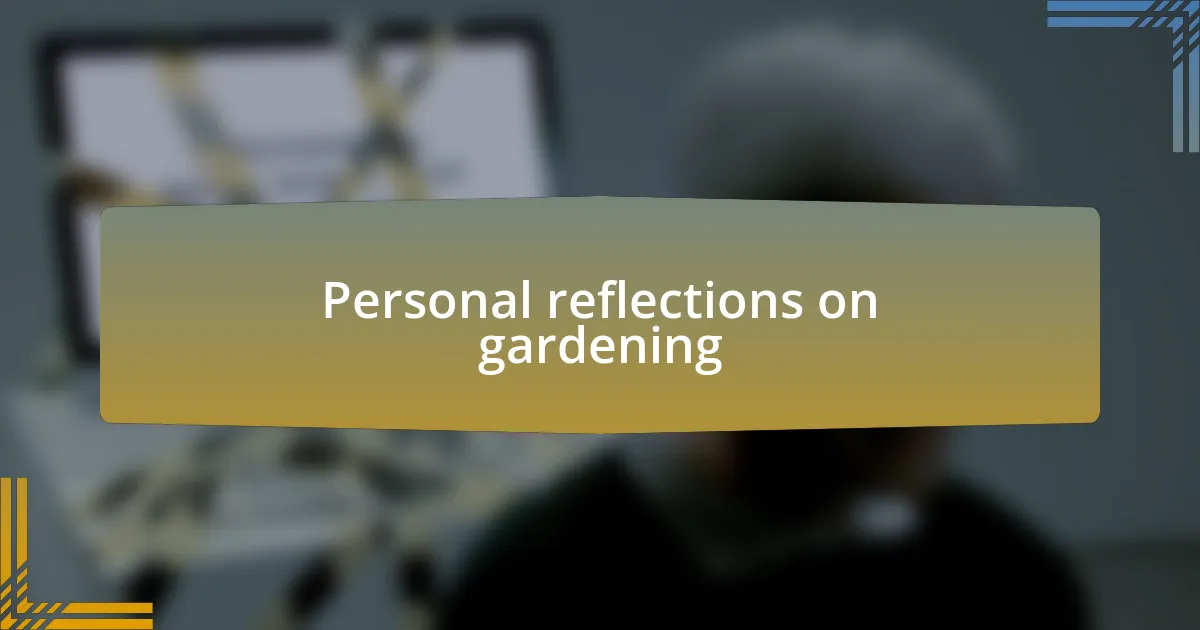
Personal reflections on gardening
Reflecting on my experiences in gardening, I’ve often found that the process is as much about self-discovery as it is about cultivating plants. I recall a time when I struggled with a particularly stubborn patch of soil that wouldn’t yield to my efforts. It taught me patience, challenging me to invest time and care before I could see any results—much like the journey of personal growth. Have you ever felt that way? It’s a reminder that nurturing something, whether it’s a plant or a part of ourselves, requires resilience.
There was a moment in one of the workshops that struck a chord with me: we discussed the importance of pruning. A fellow gardener shared her emotional journey of cutting back plants that had become overgrown. She equated that to letting go of past burdens. Hearing her story made me consider what I might need to trim from my own life to promote new growth. Isn’t it intriguing how the physical act of pruning can mirror our emotional experiences?
Gardening has also become a meditative practice for me. I remember a sunny afternoon spent weeding while listening to the birds chirp. It was in that serene moment I realized how vital it is to carve out time for quiet reflection amid our busy lives. Doesn’t it feel refreshing to disconnect from technology and engage with the earth? In those moments of stillness, I found clarity and renewed energy, reinforcing the idea that nature has an extraordinary ability to rejuvenate our spirits.
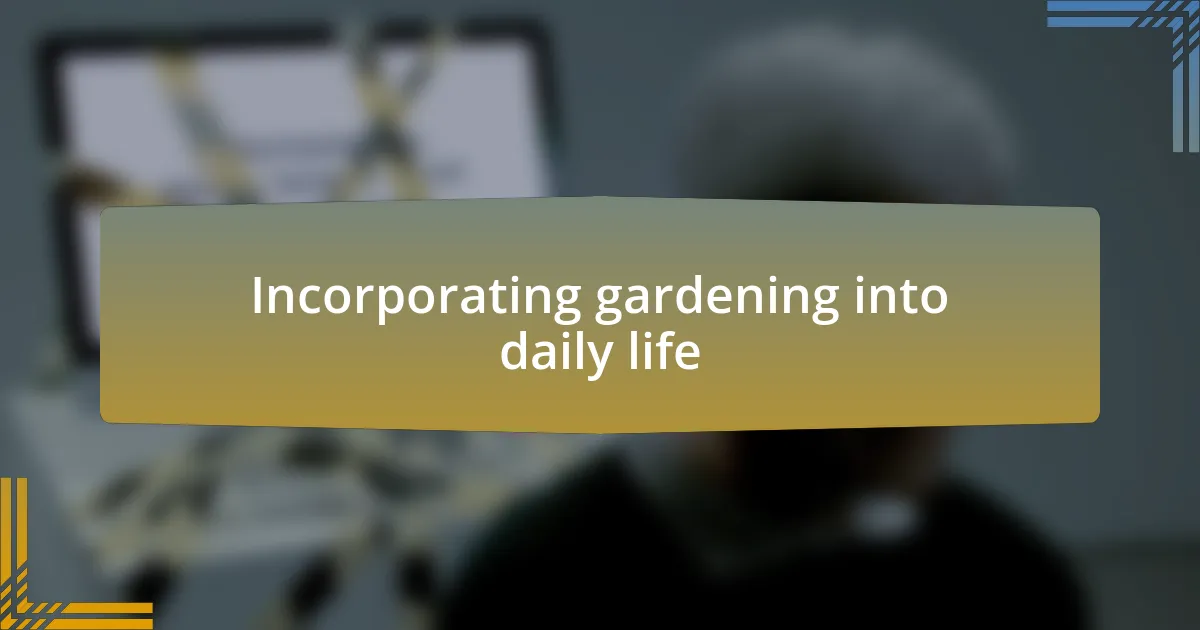
Incorporating gardening into daily life
Incorporating gardening into daily life can be a transformative experience. For instance, I started setting aside a small amount of time each morning for a brief gardening session. Simply tending to my plants—whether it was watering or checking for pests—instilled a sense of calm and purpose that often carried through the rest of my day. Have you ever noticed how such simple tasks can lay a foundation for mindfulness?
On weekends, I transformed gardening into a social affair. I invited friends over for a “planting party,” where we would share tips as we dug in the soil together. It was not only a way to cultivate my garden but also a delightful excuse to connect with others. I can’t help but ask: when was the last time you enjoyed a shared hobby that nurtured both friendships and the earth?
I also think it’s important to integrate gardening in small, manageable ways. Over time, I’ve added a few pots of herbs to my kitchen windowsill. This not only enhances my meals but also continuously reminds me of the beauty and rewards that come with nurturing life, even in the smallest forms. Does it seem daunting to maintain a garden? Starting small can turn that challenge into a fulfilling journey; you might be surprised by how much joy it can bring to your daily routine.